For Immediate Release
Commencement 2001
Brown will award nine honorary degrees at Commencement May 28
Honorary degree recipients at Brown University’s 233rd Commencement will be former Secretary of State Madeleine Korbel Albright; Kofi Annan, secretary-general of the United Nations; Professor Sheila E. Blumstein, interim president of Brown University; mathematician and physicist Demetrios Christodoulou; Oskar Eustis, artistic director of Trinity Repertory Company; Margaret H. Marshall, chief justice of the Massachusetts Supreme Judicial Court; visual scientist Lorrin A. Riggs; author Philip Roth; and Lawrence M. Small ’63, secretary of the Smithsonian Institution.
PROVIDENCE, R.I. — Brown University will present nine honorary degrees at its 233rd Commencement Monday, May 28, 2001. The degrees will be conferred during the University Convocation, which begins at approximately 11:30 a.m. on The College Green.
The recipients are former Secretary of State Madeleine Korbel Albright; Kofi Annan, secretary-general of the United Nations; Professor Sheila E. Blumstein, interim president of Brown University; mathematician and physicist Demetrios Christodoulou; Oskar Eustis, artistic director of Trinity Repertory Company; Margaret H. Marshall, chief justice of the Massachusetts Supreme Judicial Court; author Philip Roth; visual scientist Lorrin A. Riggs, a professor emeritus at Brown; and Lawrence M. Small ’63, secretary of the Smithsonian Institution.
None of the recipients is a Commencement speaker. At Brown, that honor goes to two members of the graduating class. This year, the speakers will be Ana Escrogima of New York City and Joshua Levine of North Hollywood, Calif.
However, four honorary degree recipients will speak during Commencement Weekend:
- Small will present a Commencement Forum titled “A 21st-Century Smithsonian” at 9 a.m. Saturday, May 26, in Room 001 of the Salomon Center for Teaching, located on The College Green. His talk is open to the public.
- Eustis is on a Commencement Forum panel titled “An Encounter in Copenhagen” at 2:15 p.m. Saturday, May 26, in Room 101 of Salomon Center. With fellow panelists Thomas Biersteker, director of the Watson Institute for International Studies, and Leon Cooper, Nobel Prize-winning professor of physics, Eustis will discuss how they used Michael Frayn’s Tony-award-winning play “Copenhagen” to offer a new course at Brown this spring. The session is open to the public.
- Marshall will present a Commencement Forum titled “Judicial Independence: ‘A Mighty Invention’” at 2:15 p.m. Saturday, May 26, in Sayles Hall, located on The College Green. Her talk is open to the public.
- Albright will deliver the Baccalaureate address at approximately 1:30 p.m. Sunday, May 27. For space reasons, only graduating seniors may attend the service, which will be held in the First Baptist Church in America. However, the service will be videocast to The College Green for parents and others to view.
Editors: For more information about the lectures, or for detailed biographical information and photographs of the candidates, please contact the News Service at (401) 863-2476.
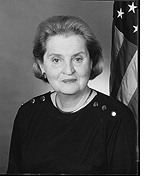 Madeleine Korbel Albright
Madeleine Korbel Albright
Doctor of Laws (LL.D.)
Between 1997 and 2001, Madeleine Korbel Albright was the 64th secretary of state of the United States. She was the first woman to hold the job and the highest-ranking woman in U.S. government history.
During her tenure, the United States led efforts to expand and modernize NATO and its campaign to reverse ethnic cleansing in Kosovo, promoted peace in Northern Ireland and the Middle East, worked with Russia and North Korea to reduce nuclear dangers, and sought to enhance cooperation with China while pressing for change in such areas as human rights. Albright also presided over a historic restructuring of U.S. foreign affairs institutions to respond to 21st-century threats.
During the first Clinton administration, Albright was the U.S. permanent representative to the United Nations and a member of the President’s cabinet and National Security Council.
Since leaving government service, Albright has accepted an appointment as the first Michael and Virginia Mortara Professor in the Practice of Diplomacy at Georgetown University’s Edmund A. Walsh School of Foreign Service. She will also be a distinguished scholar at the William Davidson Institute at the University of Michigan Business School. Albright is chairman of the board of the National Democratic Institute, writing a book and pursuing a range of public policy activities.
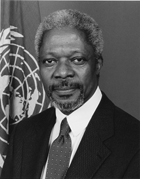 Kofi Annan
Kofi Annan
Doctor of Laws (LL.D.)
Kofi Annan is the seventh secretary-general of the United Nations. The first secretary-general to be elected from the ranks of United Nations staff, he began his term Jan. 1, 1997.
Annan’s priorities as secretary-general have been to revitalize the United Nations; to strengthen the organization’s traditional work for peace and development; to encourage and advocate human rights, the rule of law and the universal values of equality, tolerance and human dignity found in the U.N. Charter; and to restore public confidence in the organization.
Annan joined the United Nations system in 1962 as an administrative and budget officer with the World Health Organization. Since then he has served in a variety of capacities. In 1990, following the invasion of Kuwait by Iraq, Annan accepted a special assignment to facilitate the repatriation of more than 900 international staff and the release of Western hostages in Iraq. He subsequently led the first United Nations team negotiating with Iraq on the sale of oil to fund purchases of humanitarian aid.
He has also sought to improve the status of women in the Secretariat and build closer partnerships with groups whose strengths complement those of the United Nations.
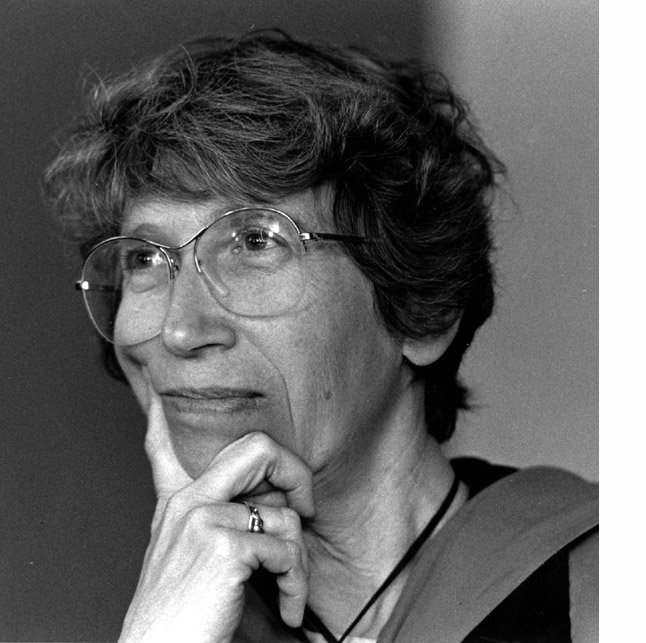 Sheila Blumstein
Sheila Blumstein
Doctor of Science (Sc.D.)
Sheila E. Blumstein, the Albert D. Mead Professor of Cognitive and Linguistic Sciences, has served as Brown University’s interim president since Feb. 9, 2000, just 48 hours after President E. Gordon Gee’s announcement that he would leave Brown for Vanderbilt University.
Blumstein, a highly respected specialist in the human production and understanding of language and its neural bases, came to Brown in 1970 as assistant professor of linguistics. She was promoted to associate professor in 1976 and became a full professor in 1981. She chaired the Department of Linguistics from 1978 to 1981, and the Department of Cognitive and Linguistic Sciences from 1986 to 1987, when she was named dean of the College. Although she announced her retirement as dean effective July 1, 1994, Blumstein continued to serve in that capacity until a successor was named in May 1995.
Late in 1997, Blumstein was asked to serve as interim provost. She agreed and served from Jan. 6, 1998, through the end of the academic year, when she returned to full-time teaching and research.
Blumstein has received numerous academic honors, including a Guggenheim Fellowship and election to the American Academy of Arts and Sciences.
 Demetrios Christodoulou
Demetrios Christodoulou
Doctor of Science (Sc.D.)
Demetrios Christodoulou is considered by many to be the preeminent contemporary thinker about Einstein’s theory of general relativity.
In September 1968, a month shy of his 17th birthday, Christodoulou was admitted to Princeton’s graduate program in physics. His research explored the thermodynamics of black holes, and he received his doctorate in physics in June 1971.
He is credited with the discovery of what is now known as the Christodoulou Memory Effect, discovered 70 years after Einstein’s theory was first formulated. It states that there is a permanent change, a “memory,” in the wave field from a gravitational wave burst. Another milestone is his work on “naked” singularities. Singularities, or points of infinite density that are formed when matter or field energy collapses, are hypothesized to exist within black holes, from which nothing can escape. What Christodoulou showed was that a “naked” singularity could exist outside of a black hole.
Since 1971, Christodoulou has worked and taught at leading research centers and universities. He was appointed professor of mathematics at Princeton in 1992, and since 1998 has been affiliated with Princeton’s physics department as well.
He is the recipient of numerous awards and honors, including Guggenheim and MacArthur fellowships.
 Oskar Eustis
Oskar Eustis
Doctor of Fine Arts (D.F.A.)
Oskar Eustis is in his seventh season as artistic director at Trinity Repertory Company in Providence.
This spring, Eustis directed Trinity Rep’s two-part Cider House Rules, and previously directed the company’s productions of Julius Caesar; Slavs!; Long Day’s Journey into Night; Voir Dire; Angels in America, Part I: Millennium Approaches (for which he received the Elliot Norton Award for Outstanding Director from the Boston Theatre Critics Circle); Angels in America, Part II: Perestroika; Into the Woods; Ambition Facing West; The Music Man; Nine Armenians; and As You Like It.
Eustis, who is a visiting associate professor of theater at Brown, has worked as a director, dramaturg and artistic director for theaters around the world. Between 1981 and 1986, he was resident director and dramaturg at the Eureka Theatre Company in San Francisco, and in 1989 he became its artistic director. While there, he commissioned Tony Kushner’s Angels in America. Eustis directed its world première at the Mark Taper Forum in Los Angeles, where he became associate artistic director in 1989. The Los Angeles production received six Los Angeles Drama Critics Circle Awards and eleven Drama-Logue Awards.
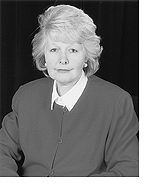 Margaret H. Marshall
Margaret H. Marshall
Doctor of Laws (LL.D.)
Margaret H. Marshall is chief justice of the Massachusetts Supreme Judicial Court. First appointed a justice of the court in November 1996, she was named chief justice in September 1999. She is the second woman to serve on the Supreme Judicial Court and the first woman to serve as chief justice.
Born in South Africa, Marshall led several student organizations while an undergraduate at Witwatersrand University in Johannesburg. As president of the 20,000-member National Union of South African Students, Marshall helped lead anti-apartheid activities and protests amid threatening government opposition.
In 1968, she came to the United States to do graduate work. She earned a master’s degree from Harvard University (1969) and a law degree from Yale University (1976). While a graduate student at Harvard, she served as a consultant to organizations and foundations concerned with ending apartheid.
Before being named vice president and general counsel of Harvard in 1992, Marshall practiced law in several Boston firms, specializing in intellectual property matters. Among her awards and honors is the American Bar Association’s Margaret Brent Women Lawyers of Achievement Award, which honors a female lawyer who has achieved professional excellence within her area of specialty and has “actively paved the way to success for other women lawyers.”
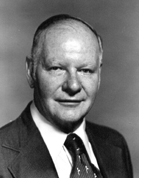 Lorrin A. Riggs
Lorrin A. Riggs
Doctor of Science (Sc.D.)
Lorrin A. Riggs, a mentor and teacher for 39 years to Brown University undergraduates, graduate students and faculty colleagues, is legendary in the field of visual science.
He is widely regarded as the developer of the stabilized image technique, which was a critical step in revealing how the eye sees and how the brain receives visual information. Experimenting on himself, Riggs devised an eyepiece that stabilized the visual input to the eye. His research ultimately demonstrated that if the image of the world were stopped from moving on the back of the eye, everything disappears.
In addition, Riggs and his students conducted many of the seminal experiments on recordings from the eye and the visual cortex. These techniques are now routinely used to diagnose and follow diseases of the retina and visual pathways.
Riggs began his academic career at Brown in 1938 as a research associate. He moved through the ranks of the faculty, becoming a full professor in 1951, the L. Herbert Ballou University Professor in 1960, and the Edgar J. Marston Professor of Psychology in 1968. In 1977, he was named a professor emeritus.
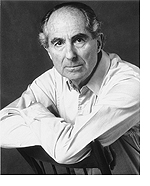 Philip Roth
Philip Roth
Doctor of Letters (Litt.D.)
In the 1990s, Philip Roth won America’s four major literary awards in succession: the National Book Critics Circle Award for Patrimony (1991), the PEN/Faulkner Award for Operation Shylock (1993), the National Book Award for Sabbath’s Theater (1995) and the Pulitzer Prize in fiction for American Pastoral (1997). He won the Ambassador Book Award for the English-Speaking Union for I Married a Communist (1998); in the same year he received the National Medal of Arts at the White House.
Previously he won the National Book Critics Circle Award for The Counterlife (1986) and the National Book Award for his first book, Goodbye Columbus (1959). In 2000 he published The Human Stain, concluding a trilogy that depicts the ideological ethos of postwar America. For The Human Stain Roth received his second PEN/Faulkner Award as well as Britain’s W.H. Smith Award for the Best Book of the Year.
This year he received the highest award of the American Academy of Arts and Letters, the Gold Medal in fiction, given every six years “for the entire work of the recipient.” His latest novel, The Dying Animal, was published this month.
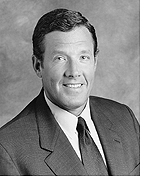 Lawrence M. Small
Lawrence M. Small
Doctor of Humane Letters (L.H.D.)
On Jan. 24, 2000, Lawrence M. Small became the 11th secretary of the Smithsonian Institution after having served for nearly a decade as president and chief operating officer of Fannie Mae, the world’s largest housing finance company.
Before joining Fannie Mae, Small worked at Citicorp/Citibank, the largest U.S. banking institution, for 27 years. His numerous posts within the firm entailed work in the United States as well as abroad in such positions as senior executive in charge of commercial banking, information technology, human resources, and worldwide corporate banking. He ended his tenure there as vice chairman and chairman of the Executive Committee of the Board of Directors.
Small has served on more than a dozen boards, committees and organizations ranging from the Spanish Repertory Theatre in New York City to the U.S. Holocaust Memorial Council to Morehouse College, a historically black institution in Atlanta. He also has served on the boards of trustees of the John F. Kennedy Center for the Performing Arts, the National Gallery and the Woodrow Wilson International Center for Scholars. In addition, he is a trustee emeritus of Brown University, from which he graduated in 1963 with highest honors in Spanish literature.
######

